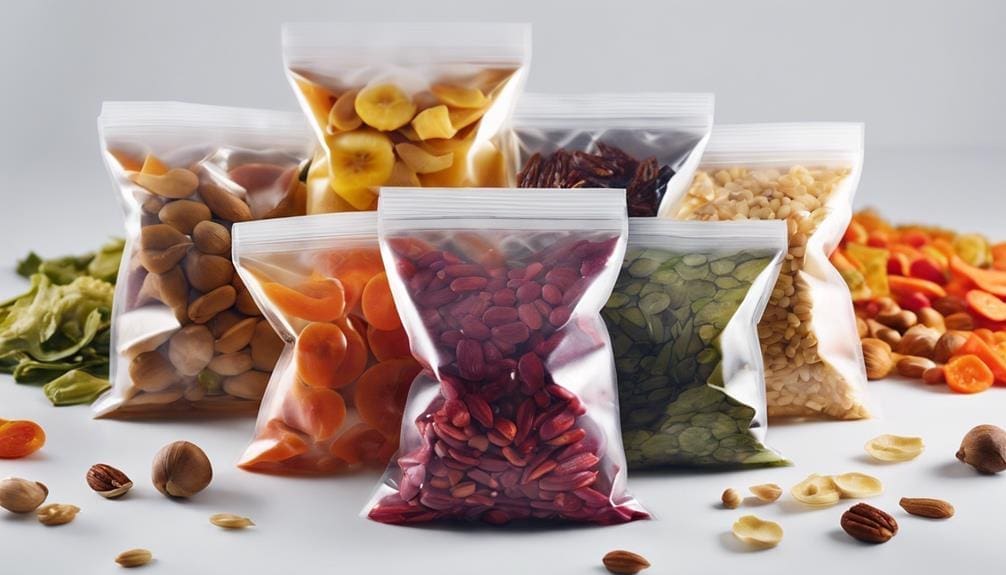For nutrient-rich lightweight vegetarian meals, opt for dehydrated options. These meals maintain 98% of nutrients, have a 6-month shelf life, and are easy to rehydrate with hot water. Use ingredients like dehydrated lentils, rice, and beans for protein, combined with vacuum-sealed veggies and nut butters for sustained energy. Enhance taste and nutrition with creative coconut milk powder recipes. You can enjoy Tofu & Chickpeas Curry or Peach Salsa Rice Salad while minimizing pack weight. Prioritize plant-based proteins like lentils and tofu for a sustainable menu. Choose compact, nutrient-dense options for delicious vegetarian dishes on your backpacking adventures.
Key Takeaways
- Dehydrate vegetables, legumes, and pre-packaged meals for lightweight options.
- Opt for nutrient-dense ingredients like dehydrated lentils, rice, and beans.
- Consider plant-based proteins such as tofu and chickpeas for sustainability.
- Incorporate whole grains and healthy fats to boost energy content.
- Use efficient cooking methods like rehydrating with hot water to save weight.
Nutritious Dehydrated Backpacking Meals
When preparing for your lightweight backpacking journey, selecting nutritious dehydrated meals is crucial for maintaining optimal nutrient intake and minimizing pack weight. Dehydrated backpacking meals offer a convenient way to fuel your body on the trail while keeping your pack light. These meals, particularly vegetarian options, provide a quick and simple solution for hikers seeking nutrient-rich food that's easy to prepare.
Opting for dehydrated vegetarian backpacking meals guarantees you receive the necessary nutrients for sustained energy during your outdoor excursions. The dehydration process preserves up to 98% of the original nutrients, making these meals a dependable source of essential vitamins and minerals. Moreover, dehydrated meals have a longer shelf life, lasting up to 6 months, which is beneficial for extended trips. Rehydrating these meals on the trail is effortless; all you need is hot water to enjoy a flavorful and nourishing dish. Embrace the ease and effectiveness of dehydrated vegetarian backpacking meals as you set off on your next journey.
Creative Coconut Milk Powder Recipes
To elevate the nutritional profile and taste of your backpacking meals, incorporating creative coconut milk powder recipes can offer a versatile and lightweight solution for enhancing your outdoor culinary experience.
Coconut milk powder, a dairy-free and nutrient-rich ingredient, is ideal for vegan backpacking trips. Reconstituting this powder with water creates a creamy base for sauces, dressings, and flavorful dishes on the trail.
Packed with healthy fats and medium-chain triglycerides, coconut milk powder provides sustained energy and hydration, perfect for your outdoor adventures.
Additionally, using coconut milk powder in your backpacking meals not only enhances taste and nutrition but also promotes sustainability by reducing packaging waste.
Embrace the convenience and benefits of coconut milk powder in your cooking to create delicious, lightweight, and sustainable vegetarian dishes that will fuel your body and satisfy your taste buds during your outdoor excursions.
Easy-to-Carry Vegetarian Ingredients
For backpacking trips focused on vegetarian meals, selecting easy-to-carry ingredients is essential for ensuring a balanced and nutrient-rich diet while keeping your pack lightweight.
Dehydrated lentils, rice, and beans are excellent choices as they're lightweight and provide essential protein and carbohydrates. Vacuum-sealed dehydrated vegetables like tomatoes, zucchini, and green beans are convenient to pack and rehydrate on the trail, offering a quick and easy way to incorporate nutrients.
If you're looking for high-calorie options, nut butters, tuna packets, and Indian lentils are great choices for vegetarian backpackers needing a quick energy boost. Additionally, lightweight and nutrient-dense options such as raisins, nutrition bars, hard cheese, and dates can provide the necessary energy for your hiking adventures.
Consider carrying low-sodium bouillon cubes to enhance the flavor of cooked grains and elevate the taste of your vegetarian backpacking meals, ensuring a satisfying dining experience while out in nature.
Flavorful Plant-Based Meal Ideas
Selecting tasty plant-based meal ideas is crucial for enhancing the nutrient profile and dining satisfaction of your vegetarian backpacking experience.
When planning your lightweight vegetarian backpacking meals, consider options like Tofu Noodles with Vegetables & Rice or Lentils & Vegetables with Rice to provide a balance of carbohydrates, proteins, and essential nutrients for your outdoor adventures.
To add variety and protein to your meals, try incorporating ingredients such as textured vegetable protein (TVP) or Beyond Burger. Dehydrating tofu, lentils, and vegetables at home can help reduce weight and make sure you have nutritious options on the trail.
For an invigorating and easy-to-prepare meal choice, consider cold-soak salads like Peach Salsa Rice Salad or Quinoa & Bean Cilantro Salad.
Explore diverse plant-based meal options ranging from Tofu & Chickpeas Curry to Inca Stew to keep your backpacking menu exciting and flavorful.
Sustainable Backpacking Menu Options
When planning your backpacking menu, consider eco-friendly food choices to minimize waste and environmental impact. Opt for lightweight, dehydrated ingredients to reduce packaging waste and make your pack lighter.
Focus on plant-based proteins like lentils and tofu for sustainable and nutrient-dense meal options on the trail.
Eco-Friendly Food Choices
To make your backpacking meals more eco-friendly, prioritize using reusable containers and opting for biodegradable packaging. When planning your plant-based backpacking menu, consider incorporating dehydrated fruits for a lightweight and sustainable option. These fruits not only provide essential nutrients but also reduce the need for refrigeration, minimizing energy consumption on the trail. Opt for eco-friendly protein sources like legumes, nuts, and seeds to lower your environmental impact. Choosing locally sourced, organic, or non-GMO ingredients further enhances the sustainability of your meals. By making these conscious choices, you can enjoy nutritious backpacking meals while reducing your carbon footprint.
| Eco-Friendly Food Choices | Benefits |
|---|---|
| Reusable containers | Reduce single-use plastics |
| Biodegradable packaging | Minimize waste on the trail |
Minimal Waste Strategies
As you focus on minimizing waste and maximizing sustainability in your backpacking endeavors, incorporating minimal waste strategies into your vegetarian lightweight backpacking meals becomes paramount. Opt for dehydrated or freeze-dried vegetarian meals to reduce packaging and food waste during your backpacking trips.
Utilize reusable containers and eco-friendly utensils to lessen single-use plastic waste along the trail. Plan your meals thoughtfully, emphasizing portion control and efficient packing to avoid excess food that might end up being discarded.
Composting organic waste like fruit peels and leftover food can further reduce your environmental impact while backpacking. Consider choosing sustainable food options such as locally sourced ingredients or organic products to align with eco-friendly practices and support the environment during your outdoor adventures.
Plant-Based Nutrition Tips
Embracing plant-based nutrition on your backpacking adventures offers a sustainable and nutrient-rich approach to fueling your body for peak performance on the trail.
Opting for lightweight and eco-friendly plant-based options like dehydrated fruits, nuts, seeds, whole grains, and plant-based proteins can provide sustained energy and essential nutrients.
Incorporating legumes, colorful fruits, and vegetables not only enhances the antioxidant and phytonutrient intake but also supports immune function during outdoor activities.
Plant-based protein sources such as lentils, tofu, and quinoa can help maintain muscle mass and offer long-lasting energy for those extended hikes.
Energy-Packed Vegetarian Recipes
Craft energy-packed vegetarian recipes for your backpacking adventures by incorporating high-protein ingredients like lentils, tofu, and TVP. These plant-based sources not only provide essential amino acids for muscle repair but also offer long-lasting energy for your outdoor excursions.
Consider mixing in nutrient-dense foods such as quinoa, beans, and nuts to sustain your energy levels throughout the day. Dehydrated fruits like apricots, figs, and berries can add a natural sweetness while providing a quick energy boost on the trail. Opt for plant-based protein sources such as chickpeas and edamame to make sure you're getting the necessary nutrients without weighing down your pack.
To further enhance the energy content of your vegetarian backpacking meals, incorporate whole grains like brown rice, bulgur, and oats. These carbohydrates are essential for fueling your body during physical activities. Additionally, adding healthy fats from sources like avocado, nuts, and olive oil can help you maintain endurance and stay satisfied during your adventures.
Minimize Pack Weight With Veggie Meals
When aiming to minimize pack weight with veggie meals, focus on packing nutritious ingredients and utilizing easy cooking methods.
Opt for dehydrated vegetarian meals that are lightweight yet packed with essential nutrients to sustain you on your journey.
Packing Nutritious Ingredients
To pack nutritious ingredients for vegetarian lightweight backpacking meals and minimize pack weight, prioritize dehydrated vegetables such as tomatoes, green beans, and zucchini for their lightweight and nutrient-dense properties. These dried vegetables not only provide essential vitamins and minerals but also weigh less than fresh produce, making them ideal for backpackers.
Additionally, incorporating nut butters, tuna packets, and Indian lentils can offer quick and calorie-dense options, aiding in reducing the overall weight of your pack while ensuring you receive the necessary nutrients for your journey. Low-sodium bouillon cubes mixed with cooked grains can enhance flavors without adding extra weight.
Remember to pack raisins, nutrition bars, hard cheese, and dates for a lightweight energy boost during your vegetarian backpacking adventure.
Easy Cooking Methods
Minimize the weight of your pack while preparing nutritious vegetarian meals on the trail by exploring efficient cooking methods that emphasize lightweight ingredients.
Dehydrating vegetables and legumes can greatly reduce weight by removing water content while retaining essential nutrients. Opt for pre-packaged dehydrated meals as they provide convenient and lightweight options for vegetarian backpackers.
Quick cooking methods such as soaking and simmering help conserve fuel during meal preparation. Rehydrate dehydrated meals with hot water for easy and efficient cooking on the go.
Incorporating freeze-dried ingredients into your vegetarian backpacking recipes guarantees nutritional value is maintained while reducing pack weight. By utilizing these strategies, you can enjoy delicious and wholesome meals without compromising on nutrition or convenience during your outdoor adventures.
Convenient Plant-Based Backpacking Foods
Incorporating a variety of convenient plant-based foods into your backpacking meals enhances nutritional value and minimizes pack weight without sacrificing flavor or sustenance. When planning your outdoor adventures, consider including plant-based protein sources, dehydrated fruits, nuts, and coconut milk powder in your meals. These options offer a lightweight and compact way to carry essential nutrients, energy, and flavor on your hikes. Below is a table showcasing some convenient plant-based backpacking foods:
| Plant-Based Foods | Benefits |
|---|---|
| Dehydrated Fruits | Portable, high in nutrients |
| Nuts | Rich in healthy fats and protein |
| Seeds | Good source of plant-based protein |
| Coconut Milk Powder | Adds creaminess and flavor |
Tasty and Lightweight Vegetarian Dishes
Enhance your backpacking experience with flavorful and nutrient-packed vegetarian dishes that are both delicious and lightweight.
- Vegan Freeze-Dried Meals:
Opt for vegan freeze-dried options such as Green-Lentil Chili or Ratatouille for convenient and high-calorie meals on the trail.
- Protein-Packed Choices:
Boost your protein intake with ingredients like tofu, lentils, and textured vegetable protein (TVP) in dishes like Root Bark Stew.
- Cold-Soak Delights:
Enjoy no-cook meal choices with Peach Salsa Rice Salad or Edamame Hummus Tortillas that are easy to prepare and carry.
- Compact and Nutrient-Dense:
Dehydrate tofu, vegetables, and beans to create compact and nutrient-dense meals that are perfect for backpacking trips.
Frequently Asked Questions
What Vegetarian Food Is Good for Hikers?
For hikers, good vegetarian options include trail mix, dehydrated fruits, varied nut butters, and a selection of protein bars. These choices offer nutrient-dense, balanced fuel for your adventures, ensuring you stay satisfied and energized.
What Food Is Good for Multi Day Backpacking?
For multi-day backpacking, prioritize nutrient-dense dehydrated fruits and nuts, instant oatmeal, energy bars, freeze-dried vegetables and pasta, nut butter, and tortillas. These lightweight options provide essential nutrients, sustained energy, and convenience for your extended trek.
What Vegan Food to Pack for Hiking?
When hiking, pack vegan snacks like dehydrated fruits, nut butters, and protein bars for sustained energy. These nutrient-dense options will keep you fueled and satisfied on the trails, providing essential vitamins and minerals.
How Do You Pack Food for a 3 Day Backpacking Trip?
When prepping for a 3-day backpacking trip, plan meals for nutritional balance, pack lightweight dehydrated options for weight management, and use compact storage. Organize food in resealable bags, include high-protein choices, and bring nutrient-dense snacks for sustained energy.
Conclusion
To sum up, incorporating lightweight vegetarian meals into your backpacking menu can provide you with nutritious, energy-packed options that are easy to carry and flavorful.
By utilizing dehydrated ingredients, plant-based proteins, and creative recipes, you can enjoy sustainable and delicious meals while minimizing pack weight.
Consider trying out some of the convenient and tasty vegetarian dishes mentioned above to fuel your outdoor adventures with nutrient-dense and balanced nutrition.














